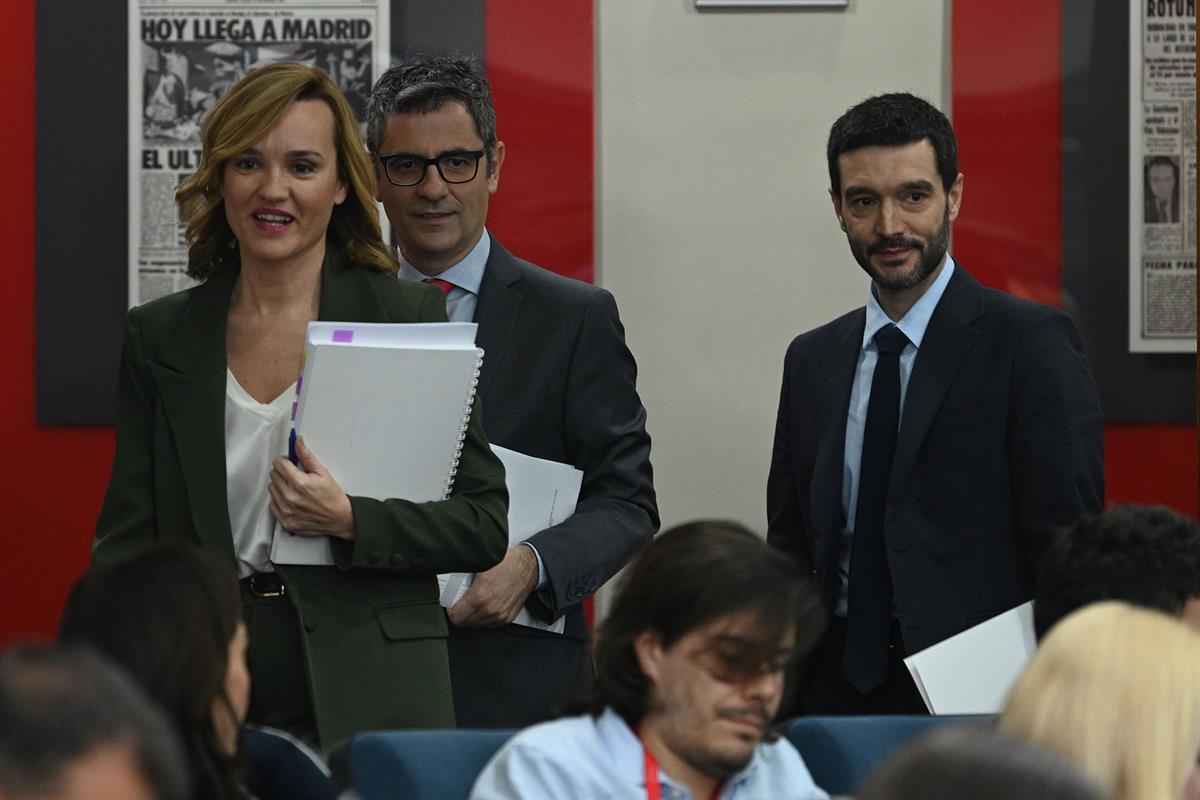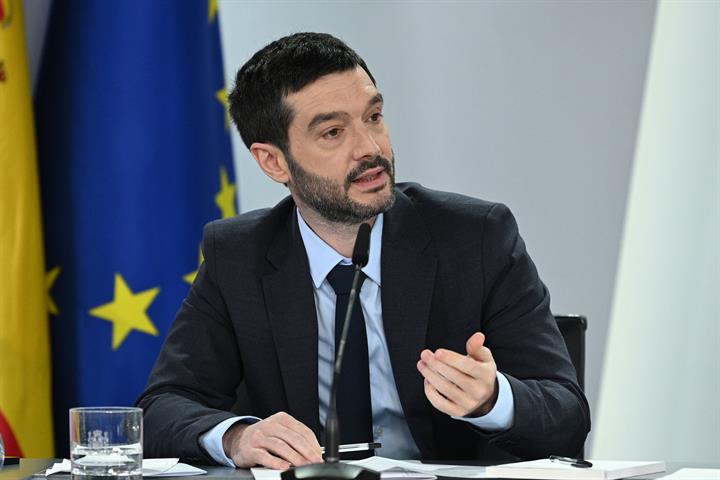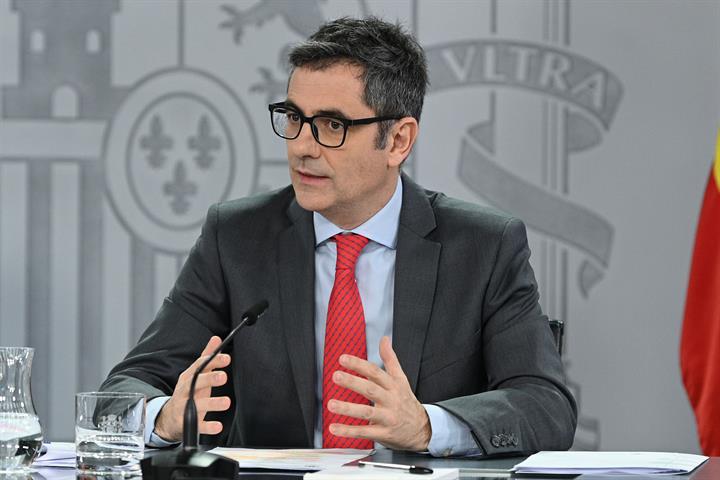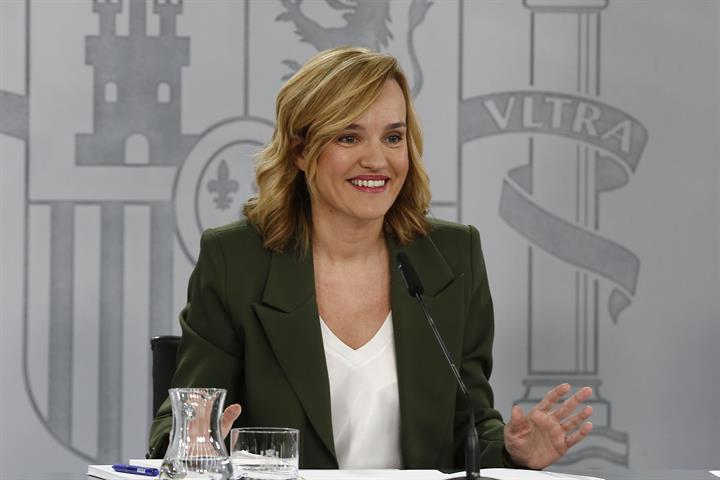The Government of Spain approves new basic material assistance programme for the most vulnerable families
Council of Ministers - 2024.1.23
Moncloa Palace, Madrid
 The Minister for Education, Vocational Training and Sports, and Government Spokesperson, the Minister for the Presidency, Justice and Relations with the Courts, and the Minister for Social Rights, Consumer Affairs and Agenda 2030 (Pool Moncloa/Borja Puig de la Bellacasa)
The Minister for Education, Vocational Training and Sports, and Government Spokesperson, the Minister for the Presidency, Justice and Relations with the Courts, and the Minister for Social Rights, Consumer Affairs and Agenda 2030 (Pool Moncloa/Borja Puig de la Bellacasa)
The Council of Ministers has launched a programme to provide the most vulnerable families with 'wallet cards' or vouchers redeemable for food products and basic necessities.
The Minister for Social Rights, Consumer Affairs and Agenda 2030, Pablo Bustinduy, stressed that this is "a decisive step towards dignifying social protection and ensuring that families with dependent children do not have to wait in hunger queues", because they will be able to buy these basic products in the supermarket.
Bustinduy also highlighted the increase in the amount of aid that families will receive - between €130 and €220 euros, depending on the number of members in the family unit - as well as the fact that beneficiaries will have direct access to fresh produce such as fruit and vegetables, something that the nature of the previous system of distributing bags made impossible.
Fighting child poverty
This basic material assistance programme will be implemented through a grant to the Spanish Red Cross of just over €100 million to launch the new model and pilot it between April, when the previous European fund ends, and 1 January 2025, when the autonomous communities will take over full management. The regional social services will determine which families can take part in the programme. These families will go to the Red Cross reference centres, where they will be given 'wallet cards' they can use in the collaborating supermarkets.
Pablo Bustinduy has indicated that some 70,000 families will benefit from the initiative, which is specifically aimed at alleviating child poverty in Spain and will improve the nutrition of the most vulnerable children and the quality of life of their families.
 The Minister for Social Rights, Consumer Affairs and Agenda 2030, Pablo Bustinduy, during his speech at the press conference after the Council of Ministers | Pool Moncloa/Borja Puig de la Bellacasa
The Minister for Social Rights, Consumer Affairs and Agenda 2030, Pablo Bustinduy, during his speech at the press conference after the Council of Ministers | Pool Moncloa/Borja Puig de la Bellacasa
The minister recalled that the autonomous communities unanimously agreed to this change of model in December 2021, and that today's decision by the Council of Ministers means giving them time and resources to organise themselves to take over management. He stressed that in fact the programme will be financed with the state tranche of the European Social Fund Plus, which will mean that the communities can use the autonomous tranche to attend to other needs and groups.
"In short, this is a decisive step towards a fairer, more dignified and more efficient model within the general framework of this ministry's action to modernise and improve social policy in our country", said Bustinduy.
Development of the fundamental right of defence
The Council of Ministers has approved the Draft Organic Law on the Right of Defence, which had already begun to be processed in the Spanish Parliament in the previous legislature, but fell when the general elections were called.
"We considered it necessary to reactivate the parliamentary processing of this law because it is a protective law that develops a fundamental right and is centred on citizens, in line with what we are establishing in Justice to make justice more accessible, more agile, more modern and with greater guarantees," explained the Minister for the Presidency, Justice and Relations with the Courts, Félix Bolaños.
The text regulates and develops the right of defence, protected in Article 24 of the Constitution, and extends it in accordance with court rulings. Bolaños argued that the law should have very broad support in Parliament "because what we are doing, at the end of the day, is guaranteeing the rights of the citizens of our country".
 The Minister for the Presidency, Justice and Relations with the Courts, Félix Bolaños, during his speech at the press conference after the Council of Ministers | Pool Moncloa/Borja Puig de la Bellacasa
The Minister for the Presidency, Justice and Relations with the Courts, Félix Bolaños, during his speech at the press conference after the Council of Ministers | Pool Moncloa/Borja Puig de la Bellacasa
The regulation was drafted following dialogue with different legal operators, who support the new law, as does, in particular, the legal profession. With the future law, lawyers "see recognised many of the rights that they, as legal assistants to citizens, can carry out", he said.
Accessibility and extension of legal aid
The law pursues two fundamental objectives: to recognise the guarantees that correspond to citizens as holders of the right of defence, and to guarantee its safeguarding.
The first chapter of the text regulates the right to a defence and establishes principles that have been developed by case law, such as the right to a trial without undue delay, the right to use evidence and the right not to suffer reprisals for having initiated legal proceedings.
Among the new aspects, the minister highlighted the extension of the right to defence to extrajudicial means of conflict resolution, a strategic line of the ministry to reduce delays in proceedings, and the compatibility of the exercise of this right with the use of telematic means in the public service.
The bill recognises the right of citizens to communicate with the Administration of Justice in clear, simple, understandable and accessible language, an aspect that will require time and training for judges and magistrates, as Félix Bolaños acknowledged. The text also extends free legal aid. It was previously only granted to people with economic difficulties, but from the approval of the law it will be extended to all people in situations of special vulnerability. In addition, all court buildings are required to be fully and universally accessible to persons with disabilities.
The second and third chapters of the law deal with the role of the legal profession, which the minister described as "essential", and establish the rights of lawyers and their ethical and client-relationship duties.
Support for education and tourism
 The Minister for Education, Vocational Training and Sports, and Government Spokesperson, Pilar Alegría, during her speech at the press conference after the Council of Ministers | Pool Moncloa/José Manuel Álvarez
The Minister for Education, Vocational Training and Sports, and Government Spokesperson, Pilar Alegría, during her speech at the press conference after the Council of Ministers | Pool Moncloa/José Manuel Álvarez
At the press conference following the Council of Ministers, the Minister for Education, Vocational Training and Sports, and Government Spokesperson, Pilar Alegría, announced that on Thursday the President of the Government and she herself will meet with the educational community at the State School Council. The meeting will address "two fundamental issues for the students and young people of our country" of "absolute public interest", to which the government wants to provide answers and propose solutions, she said.
First, the meeting will address the debate already opened by the government with the autonomous communities last December on the regulation of mobile phone use in schools. "It is a demand and a concern of families", said the minister, who advocated consensus between all education administrations on this issue.
The second aspect to be addressed with the educational community is the reinforcement plan to improve students' maths and reading comprehension skills, providing more resources to teachers and helping students and families. Pilar Alegría explained that the programme will include a reduction in the number of pupils taught by teachers through splitting groups, and extracurricular reinforcement and support classes for students, even outside school hours.
In relation to the President of the Government's agenda, the spokeswoman also referred to the new edition of the International Tourism Fair (Fitur), which is being held in Madrid from 24 to 28 January, at a "crucial" time for the sector. Alegría recalled the importance of this area for Spain, which accounts for 13% of the Gross Domestic Product (GDP) and in 2023 received 84 million international tourists, registered more than €108 billion in tourism expenditure and reached an all-time record of affiliates.
The sector, she said, is taking fundamental steps to strengthen quality, efficiency and sustainability, advances that the government has supported in recent years by investing more than €3.4 billion to boost the competitiveness and modernisation of tourism companies and improve workers' conditions.
Non official translation




